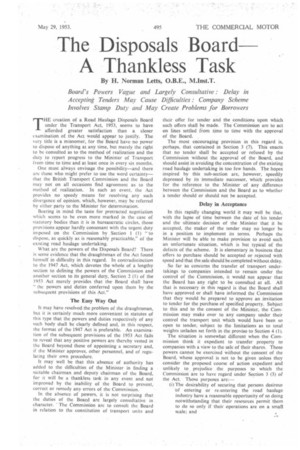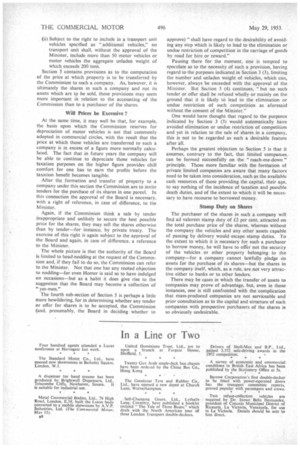The Disposals Board A Thankless Task
Page 41

Page 42

If you've noticed an error in this article please click here to report it so we can fix it.
By H. Norman Letts, 0.B.E., M.Inst.T.
Board's Powers Vague and Largely Consultative : Delay in Accepting Tenders May Cause Difficulties : Company Scheme Involves Stamp Duty and May Create Problems for Borrowers
THE creation of a Road Haulage Disposals Board under the Transport Act, 1953, seems to have afforded greater satisfaction than a closer examination of the Act would appear to justify. The very title is a misnomer, for the Board have no power to dispose of anything at any time, but merely the right to be consulted as to the method of realization and the duty to report progress to the Minister of Transport from time to time and at least once in every six months.
One must always envisage the possibility—and there are those who might prefer to use the word certainty— that the British Transport Commission and the Board may not on all occasions find agreement as to the method of realization. In such an event, the Act provides no speedy means for resolving any such divergence of opinion, which, however, may be referred by either party to the Minister for determination.
Bearing in mind the taste for protracted negotiation which seems to be even more marked in the case of statutory bodies than it is in bureaucratic circles, those provisions appear hardly consonant with the urgent duty imposed on the Commission by Section 1 (1) "to dispose, as quickly as is reasonably practicable," of the existing road haulage undertaking.
What are the powers of the Disposals Board? There is some evidence that the draughtsman of the Act found himself in difficulty in this regard. In contradistinction to the 1947 Act, which devotes the whole of a lengthy section to defining the powers of the Commission and another section to its general duty, Section 2 (I) of the 1953 Act merely provides that the Board shall have " the powers and duties conferred upon them by the subsequent provisions of this Act" The Easy Way Out It may have resolved the problem of the draughtsman, but it is certainly much more convenient in statutes of this type that the powers and duties respectively of any such body shall be clearly defined and, in this respect, the format of the 1947 Act is preferable. An examination of the subsequent provisions of the 1953 Act fails to reveal that any positive powers are thereby vested in the Board beyond those of appointing a secretary and, if the Minister approves, other personnel, and of regulating their own procedure.
It may well be that this absence of authority has added to the difficulties of the Minister in finding a suitable chairman and deputy chairman of the Board, for it will be a thankless task in any event and not improved by the inability of the Board to prevent, correct or remedy any errors of the Commission.
In the absence of powers, it is not surprising that the duties of the Board are largely consultative in character. " The Commission are to consult the Board in relation to the constitution of transport units and their offer for tender and the conditions upon which such offers shall be made. The Commission are to act on lines settled from time to time with the approval of the Board.
The most encouraging provision in this regard is, perhaps, that contained in Section 3 (7). This enacts that no tender shall be accepted or refused by the Commission without the approval of the Board, and should assist in avoiding the concentration of the existing road haulage undertaking in too few hands. The hopes inspired by this sub-section are, however, speedily depressed by its immediate successor, which provides for the reference to the Minister of any difference between the Commission and the Board as to whether a tender should or should not be accepted.
Delay in Acceptance In this rapidly changing world it may well be that, with the lapse of time between the date of his tender and the ultimate decision of the Minister that it be accepted, the maker of the tender may no longer be in a position to implement its terms. Perhaps the Minister will be able to make provision to avoid such an unfortunate situation, which is but typical of the defects of the scheme. It is elementary in business that offers to purchase should be accepted or rejected with speed and that the sale should be completed without delay.
So far as concerns the transfer of transport undertakings to companies intended to remain under the control of the Commission, it would not appear that the Board has any right to be consulted at all. All that is necessary in this regard is that the Board shall have approved or shall have informed the Commission that they would be prepared to approve an invitation to tender for the purchase of specified property. Subject to this and to the consent of the Minister, the Commission may make over to any company under their control the transport unit which would have been so open to tender, subject to the limitations as to total weights unladen set forth in the proviso to Section 4 (1).
The situation is somewhat different when the Commission think it expedient to transfer property to companies with a view to the sale of their shares. Those powers cannot be exercised without the consent of the Board, whose approval is not to be given unless they consider the proposed course of action expedient and unlikely to prejudice the purposes to which the Commission are to have regard under Section 3 (3) of the Act. Those purposes are:— (i) The desirability of securing that persons desirous of entering or re-entering the road haulage industry have a reasonable opportunity of so doing notwithstanding that their resources permit them to do so only if their operations are on a small scale; and (ii) Subject to the right to include in a transport unit vehicles specified as "additional vehicles," no transport unit shall, without the approval of the Minister, include more than 50 motor vehicles or motor vehicles the aggregate unladen weight of which exceeds 200 ton's.
Section 5 contains provisions as to the computation of the price at which property is to be transferred by the Commission to such a company. As, however, it is ultimately the shares in such a company and not its assets which are to be sold, those provisions may seem more important in relation to the accounting of the Commission than to a purchaser of the shares.
Will Prices be Excessive ?
At the same time, it may well be that, for example, the basis upon which the Commission reserves for depreciation of motor vehicles is not that commonly adopted in commercial circles, with the result that the price at which those vehicles are transferred to such a company is in excess of a figure more normally calculated. The fact that in future years the company will be able to continue to depreciate those vehicles for taxation purposes on the higher figure provides chill comfort for one has to earn the profits before the taxation benefit becomes tangible.
After the formation and transfer of property to a company under this section the Commission are to invite tenders for the purchase of its shares in one parcel. In this connection the approval of the Board is necessary, with a right of reference, in case of difference, to the Minister.
Again, if the Commission think a sale by tender inappropriate and unlikely to secure the best possible price for the shares, they may sell the shares otherwise than by tender—for instance, by private treaty. The exercise of this right is again subject to the approval of the Board and again, in case of difference, a reference to the Minister.
The whole picture is that the authority of the Board is limited to head-nodding at the request of the Commission and, if they fail to do so, the Commission can refer to the Minister. Not that one has any rooted objection to nodding—for even Romer is said so to have indulged on occasions—but as a habit it does give rise to the suggestion that the Board may become a collection of "yes-men."
The fourth sub-section of Section 5 is perhaps a little more bewildering, for in determining whether any tender or offer for shares is to be accepted, the Commission (and, presumably, the Board in deciding whether to approve)" shall have regard to the desirability of avoiding any step which is likely to lead to the elimination or undue restriction of competition in the carriage of goods by road for hire or reward."
Pausing there for the moment, one is tempted to speculate as to the necessity of such a provision, having regard to the purposes indicated in Section 3 (3), limiting the number and unladen weight of vehicles, which call, however, always be exceeded with the approval of the Minister. But Section 5 (4) continues, "but no such tender or offer shall be refused wholly or mainly on the ground that it is likely to lead to the elimination or undue restriction of such competition as aforesaid without the consent of the Minister."
One would have thought that regard to the purposes indicated by Section 3 (3) would automatically have avoided elimination or undue restriction of competition and yet in relation to the sale of shares in a company, this is not to be regarded as such a desirable feature after all.
Perhaps the greatest objection to Section 5 is that it assumes, contrary to the fact, that limited companies can be formed successfully on the " reach-me-down principle. Those more familiar with the formation of private, limited companies are aware that many factors need to be taken into consideration, such as the available cash resources of those providing the capital, their age. to say nothing of the incidence of taxation and possible death duties, and of the extent to which it will be necessary to have recourse to borrowed money.
Stamp Duty on Shares The purchaser of the shares in such a company will find ad valorem stamp duty of £2 per cent, attracted on the total purchase price of the shares, whereas without the company the vehicles and any other assets capable of passing by delivery would escape stamp duties. To the extent to which it is necessary for such a purchaser to borrow money, he will have to offer not the security of the vehicles or other property belonging to the company—for a company cannot lawfully pledge its assets for the purchase of its shares—but the shares in the company itself, which, as a rule, are not very attractive either to banks or to other lenders.
There may be cases in which the transfer of assets to companies may prove of advantage, but, even in those instances, one is still confronted with the complication that mass-produced companies are not serviceable and prior consultation as to the capital and structure of such companies with prospective purchasers of the shares is so obviously undesirable.




























































































